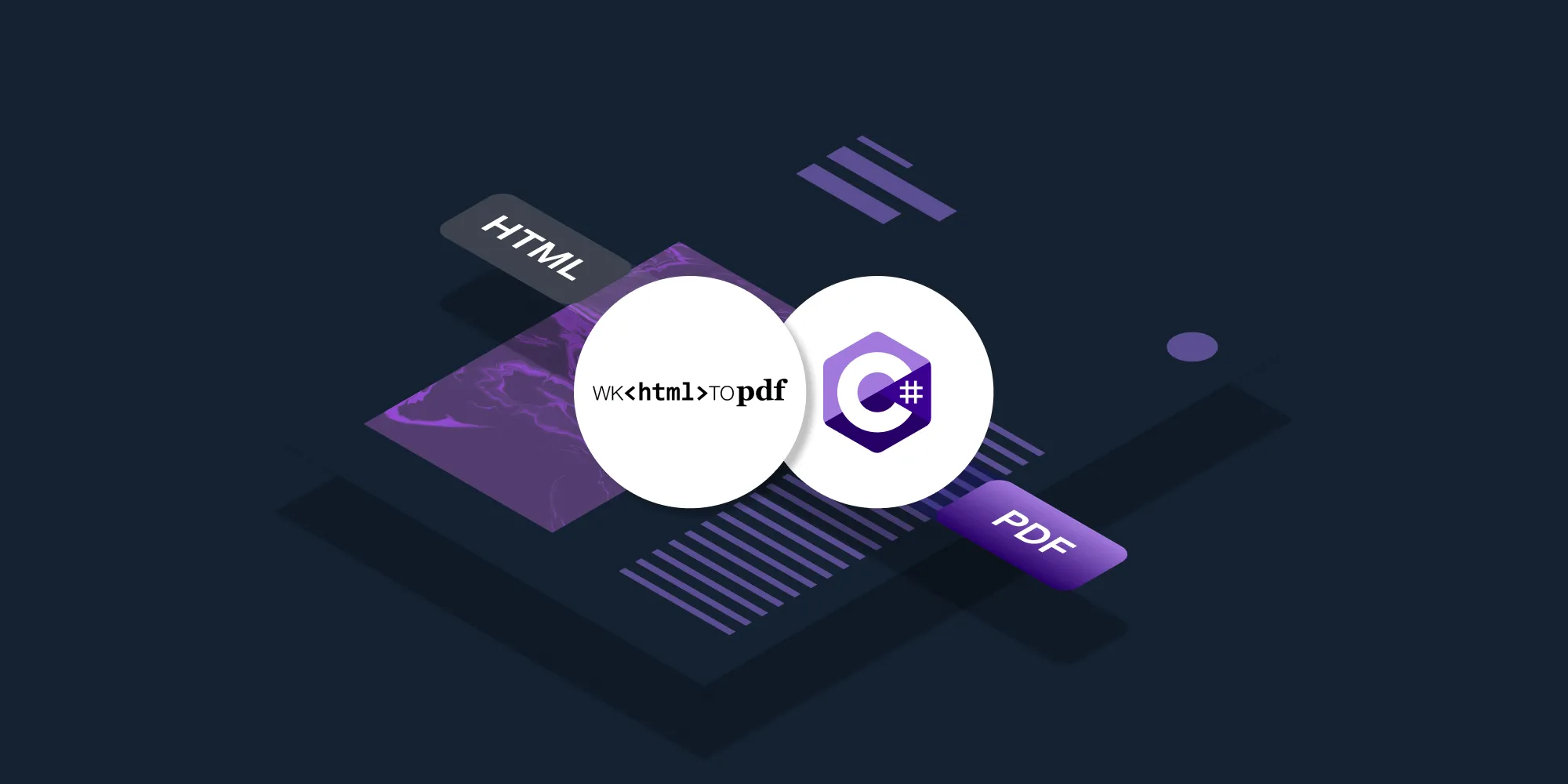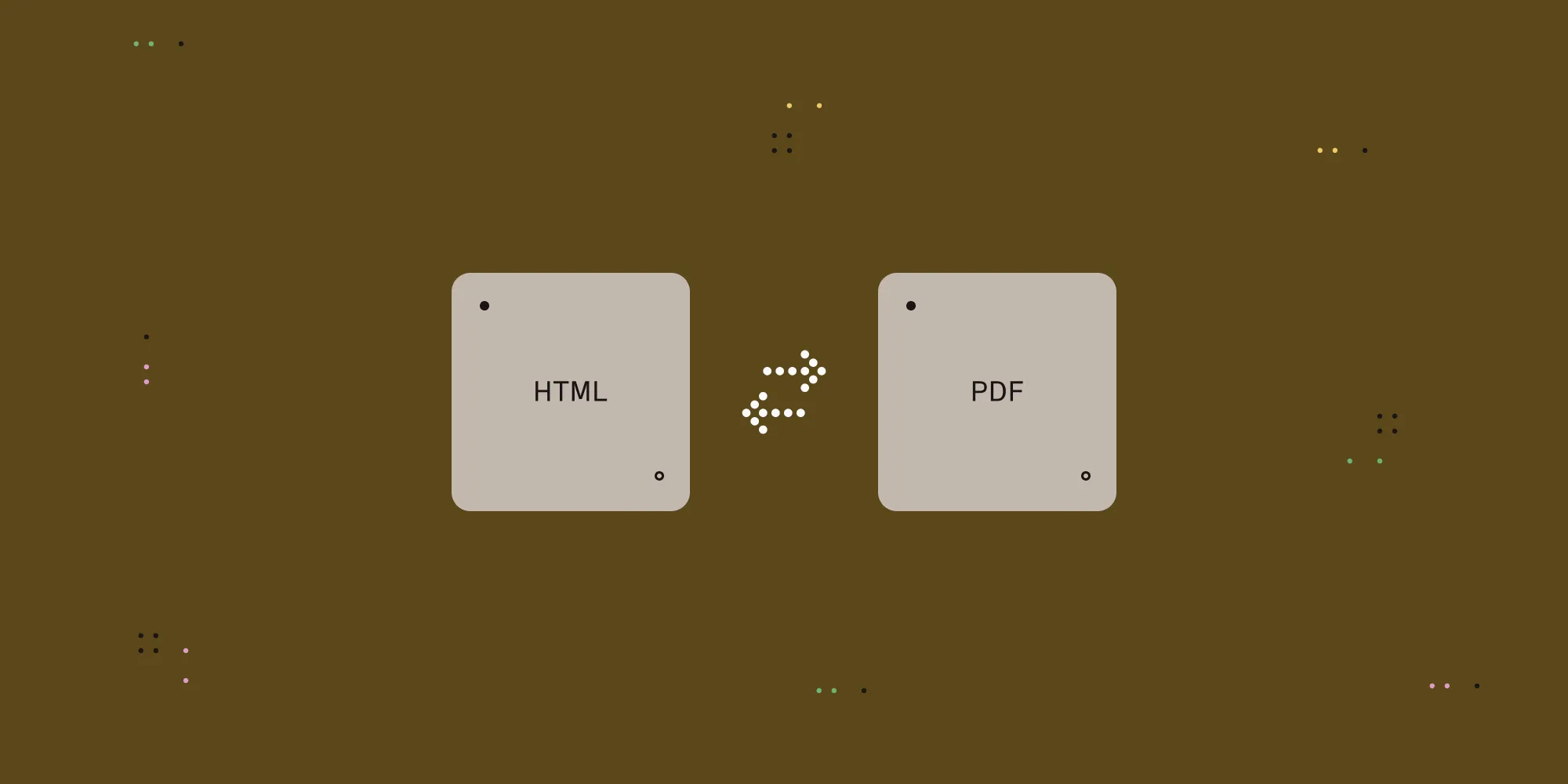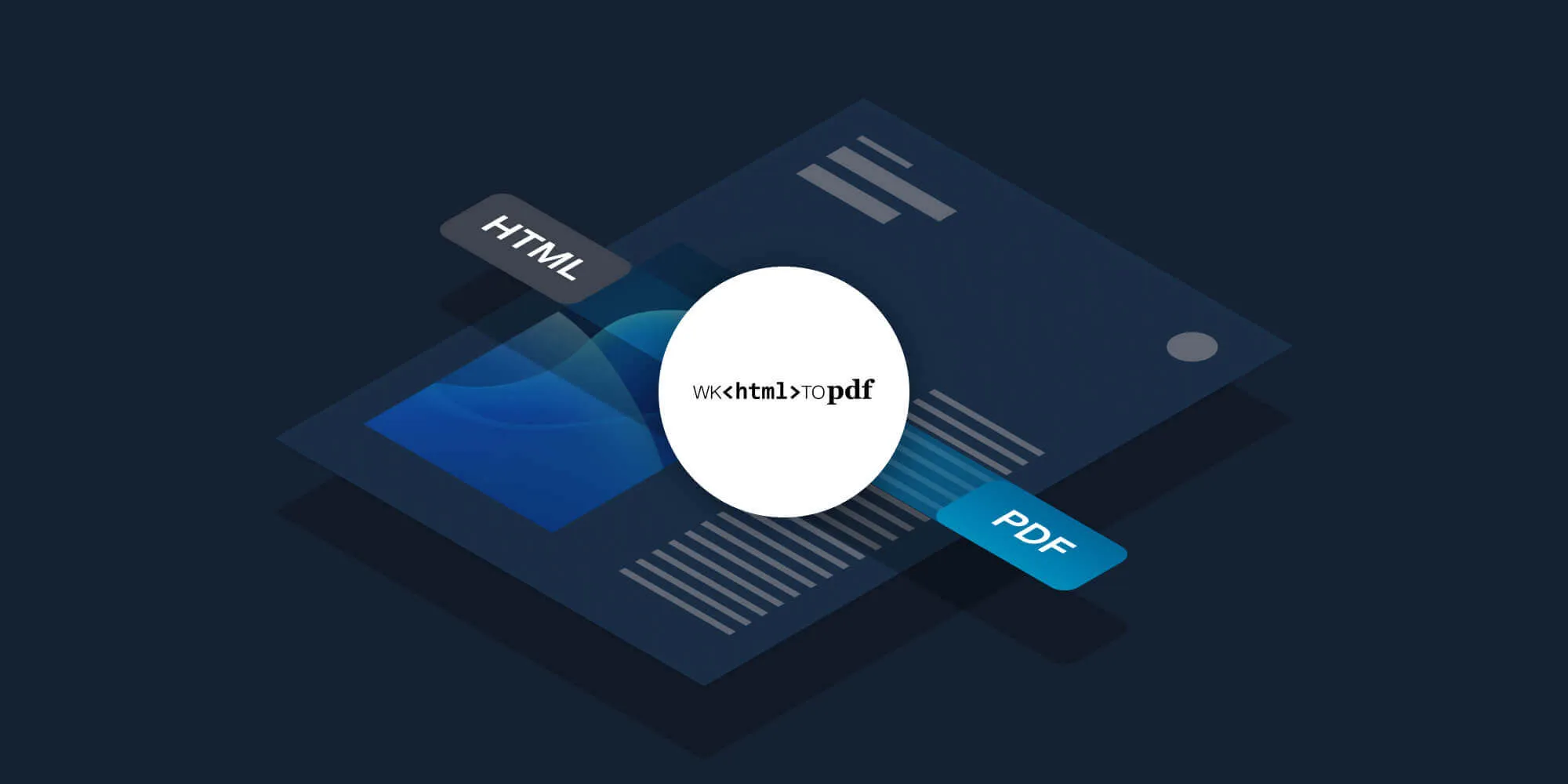How to convert HTML to PDF in C# using wkhtmltopdf
Table of contents

Need to convert HTML to PDF in C#? This article walks you through two reliable methods:
- wkhtmltopdf(opens in a new tab) — A free, open source command-line tool that uses the WebKit engine to convert HTML to high-quality PDFs in your C# apps.
- Nutrient API — A commercial, REST-based solution offering robust HTML-to-PDF conversion with better support, asset handling, and customization.
It includes installation instructions, full C# code samples, and comparison insights to help you choose the right tool for your use case.
Why convert HTML to PDF in C#?
The need to generate PDFs from HTML is common in C# applications involving reports, invoices, contracts, or web content archiving. By using tools like wkhtmltopdf or the Nutrient API, developers can render styled HTML content into precise, print-ready PDF files — all from within a C# backend or console app.
This tutorial provides two effective methods for performing HTML-to-PDF conversion in C#:
- A free command-line tool (wkhtmltopdf)
- A cloud-based and self-hosted solution via the Nutrient PDF API
Development considerations
Before getting started, it’s important to note that wkhtmltopdf is a command-line tool, and it doesn’t have a built-in graphical user interface (GUI). It’s also an open source tool, created in 2008 by Jakob Truelsen, and it isn’t being consistently maintained(opens in a new tab) at this time.
If you’re considering a commercial solution, Nutrient offers some options for you:
- HTML-to-PDF in C# API — A REST API/hosted solution that gives you 200 free conversions per month and offers additional packages for a higher processing quota.
- HTML to PDF in C# — Our self-hosted solution backed by our GdPicture.NET library.
Our solutions are regularly maintained, with releases occurring multiple times throughout the year. We also offer one-on-one support to handle any issues or challenges you may encounter.
Requirements
- Visual Studio Code(opens in a new tab) installed on your machine.
- The C# extension(opens in a new tab) for Visual Studio Code.
- Basic knowledge of C# and .NET console applications
Installing wkhtmltopdf
To install wkhtmltopdf, follow the steps for your machine below.
On Windows
- Download the wkhtmltopdf binary from the official website(opens in a new tab).
- Once the download is complete, extract the files to a directory of your choice.
- Add the directory containing the wkhtmltopdf binary to your system’s
PATHenvironment variable. This will allow you to run the wkhtmltopdf command from anywhere on your system. - Verify that wkhtmltopdf is installed correctly by running the following command in your terminal:
where wkhtmltopdfThe wkhtmltopdf executable will be located in the installation directory — by default, it’s C:\Program Files\wkhtmltopdf\bin.
On macOS
You can install wkhtmltopdf using Homebrew(opens in a new tab):
Terminal window brew install --cask wkhtmltopdfOr, you can download the binary from the official website(opens in a new tab).
If you choose to download the binary from the official website, you may see an error message that says the following:
"wkhtmltox-0.12.6-2.macos-cocoa.pkg" cannot be opened because it is from an unidentified developer.
This means your Mac’s security settings are preventing you from installing the package.
To install the package, you’ll need to change your security settings to allow installation of packages from unidentified developers. Follow the steps below:
- Right-click the
wkhtmltox-0.12.6-2.macos-cocoa.pkgfile and select Open. - A warning message will appear. Click Open.
- The package installer will open. Follow the prompts to complete the installation.
- Right-click the
Verify that wkhtmltopdf is installed correctly by running the following command in your terminal:
which wkhtmltopdfThe wkhtmltopdf executable will be located in the installation directory — by default, it’s /usr/local/bin.
On Ubuntu
If you’re using Ubuntu, you can install wkhtmltopdf by running the following command:
sudo apt-get install wkhtmltopdfCreating a C# project for HTML-to-PDF conversion
Once wkhtmltopdf is installed, follow the steps below to set up a project.
Create a new directory for your project and open it in Visual Studio Code.
Open the terminal (press Control or Command-backtick `).
Run the following command to create a new .NET console project:
Terminal window dotnet new console --framework net7.0Replace the contents of
Program.cswith the following code:
class Program { static void Main(string[] args) { Console.WriteLine("Hello, World!"); } }Method 1 — Using wkhtmltopdf to convert HTML to PDF in C#
Add the following namespace to the top of your
Program.csfile:using System.DiagnosticsThe
System.Diagnosticsnamespace provides classes and methods that allow you to interact with system processes, event logs, and performance counters.In your
Mainmethod, create a new instance of theProcessStartInfoclass and set theFileNameproperty to the path of the wkhtmltopdf binary:var processStartInfo = new ProcessStartInfo{// Pass the path of the wkhtmltopdf executable.FileName = "/usr/local/bin/wkhtmltopdf",};You can search for the executable in the file explorer. By default, it’s located in
C:\Program Files\wkhtmltopdf\binon Windows and in/usr/local/binon Mac.If you’ve installed wkhtmltopdf using a package manager like
apt-get,yum, orbrew, you can check the path using these commands:- On Linux, type
whereis wkhtmltopdf. - On macOS, type
brew info wkhtmltopdf.
Another solution is to use the full path of the executable. You can find the full path of the wkhtmltopdf executable by running the following command in your terminal:
Terminal window find / -name wkhtmltopdf 2>/dev/nullThis will search for the executable in the entire file system and print its location.
Once you’ve found the path to the wkhtmltopdf executable, you can use it in the
ProcessStartInfoclass to run the process.- On Linux, type
Set the
Argumentsproperty to include the input HTML file and the output PDF file, in that order:var inputHtml = "/Users/<username>/Desktop/<your-project-name>/bin/Debug/net7.0/input.html";var outputPdf = "output.pdf";var processStartInfo = new ProcessStartInfo{FileName = "/usr/local/bin/wkhtmltopdf",Arguments = $"{inputHtml} {outputPdf}",};The
input.htmlfile must be located in the same directory as the wkhtmltopdf executable. Make sure to use an absolute path to specify the location of the input HTML file and the output PDF file.For example, you created the
input.htmlfile in the/Users/<username>/Desktop/<your-project-name>/bin/Debug/net7.0/input.htmldirectory.Set the
UseShellExecuteproperty tofalseandRedirectStandardOutputtotrue:var processStartInfo = new ProcessStartInfo{// Pass the path of the wkhtmltopdf executable.FileName = "/usr/local/bin/wkhtmltopdf",Arguments = $"{inputHtml} {outputPdf}",UseShellExecute = false,RedirectStandardOutput = true,WorkingDirectory = AppDomain.CurrentDomain.BaseDirectory};UseShellExecute = falseallows the process to be started without creating a new window, andRedirectStandardOutput = trueenables the output of the process to be read.The
WorkingDirectoryproperty is used to set the current directory of the process.AppDomain.CurrentDomain.BaseDirectoryis used to set the current directory as the base directory of the application’s domain. This is necessary to ensure that the input and output files are located in the correct directory within the project.Start the process using the
Process.Startmethod, and wait for it to complete using theWaitForExitmethod:
using (var process = Process.Start(processStartInfo)) { process?.WaitForExit(); if (process?.ExitCode == 0) { Console.WriteLine("HTML to PDF conversion successful!"); } else { Console.WriteLine("HTML to PDF conversion failed!"); Console.WriteLine(process?.StandardOutput.ReadToEnd()); } }Once the process exits, check the ExitCode property to see if the conversion was successful. If the ExitCode is 0, it means the conversion was successful, and a success message is printed. If the ExitCode isn’t 0, it means the conversion failed and a failure message is printed, along with the standard output of the process, using the StandardOutput.ReadToEnd() method.
Find the complete code below:
// See https://aka.ms/new-console-template for more information.using System.Diagnostics;
class Program{ static void Main(string[] args) { var inputHtml = "/Users/<username>/Desktop/<your-project-name>/bin/Debug/net7.0/input.html"; var outputPdf = "output.pdf";
if (!System.IO.File.Exists(inputHtml)) { Console.WriteLine($"{inputHtml} file not found!"); return; }
var processStartInfo = new ProcessStartInfo { // Pass the path of the wkhtmltopdf executable. FileName = "/usr/local/bin/wkhtmltopdf", Arguments = $"{inputHtml} {outputPdf}", UseShellExecute = false, RedirectStandardOutput = true, WorkingDirectory = AppDomain.CurrentDomain.BaseDirectory };
Console.WriteLine($"Starting process with FileName: {processStartInfo.FileName} and Arguments: {processStartInfo.Arguments}");
using (var process = Process.Start(processStartInfo)) { process?.WaitForExit(); if (process?.ExitCode == 0) { Console.WriteLine("HTML to PDF conversion successful!"); } else { Console.WriteLine("HTML to PDF conversion failed!"); Console.WriteLine(process?.StandardOutput.ReadToEnd()); } } }}Running the project
Run the project using the dotnet run command in the terminal.
Method 2 — HTML to PDF in C# using Nutrient API
In addition to using wkhtmltopdf, you can also leverage the Nutrient API to convert HTML to PDF. The Nutrient API offers a robust and flexible solution for generating high-quality PDFs with various customization options. Below is a step-by-step guide on how to integrate Nutrient API into your C# project.
Setting up Nutrient API
First, ensure you have an API key from Nutrient API(opens in a new tab). You’ll use this key to authenticate your requests.
Open VS Code and open a terminal in VS Code (`Control-``).
Create a new directory for your project and navigate into it:
Terminal window mkdir nutrientApiDemocd nutrientApiDemoInitialize a new C# project:
Terminal window dotnet new consoleInstall the RestSharp package:
Terminal window dotnet add package RestSharpReplace the contents of
Program.cswith the provided code:using System;using System.IO;using RestSharp;class Program{static void Main(string[] args){var apiKey = "your_api_key_here"; // Replace with your actual keyvar client = new RestClient("https://api.pspdfkit.com/build");var request = new RestRequest().AddHeader("Authorization", $"Bearer {apiKey}").AddFile("index.html", "index.html").AddParameter("instructions","{\"parts\": [{\"html\": \"index.html\"}]}",ParameterType.RequestBody);var response = client.PostAsync(request).Result;if (response.IsSuccessful){File.WriteAllBytes("result.pdf", response.RawBytes);Console.WriteLine("PDF created successfully.");}else{Console.WriteLine($"Error: {response.StatusCode}");Console.WriteLine(response.Content);}}}Replace "your_api_key_here" with your actual Nutrient API key. Make sure you have
index.htmlin the same directory as yourProgram.csfile.Run the project using the terminal:
Terminal window dotnet runCheck the output directory for
result.pdfto see your newly generated PDF.
Why use Nutrient API?
- SOC 2 compliant — Build secure workflows with encrypted API endpoints.
- Easy integration — Well-documented APIs and code samples make integration straightforward.
- Robust and flexible — Access more than 30 tools to process documents in multiple ways.
- Simple and transparent pricing — Choose a package based on your needs, with clear credit costs for each API tool and action.
Conclusion
In this tutorial, you learned how to perform HTML-to-PDF conversion in C# using wkhtmltopdf. With this tool, you can easily convert HTML files to high-quality PDFs with various options for styling and formatting.
wkhtmltopdf is an open source command-line tool that offers a straightforward method for converting HTML to high-quality PDFs, though it may lack active maintenance.
Nutrient API, on the other hand, provides a commercial solution with advanced features and customization options, suitable for more complex PDF needs.
Get started with our API product for free, or integrate a free trial of our .NET PDF SDK.
FAQ
It depends on your needs. wkhtmltopdf is great for simple, free HTML-to-PDF conversions, while Nutrient API offers robust features, cloud and on-premises support, and better reliability for production use.
Yes. Using the Nutrient API or other libraries that accept raw HTML input in the request body allows you to convert HTML strings directly without writing temporary files.
wkhtmltopdf supports most CSS styles and inline JavaScript but may struggle with modern JS frameworks or dynamic content rendered client-side.
wkhtmltopdf is open source but not actively maintained. For mission-critical applications, a commercial alternative like Nutrient API is recommended.
Check that all file paths are correct and wkhtmltopdf is accessible in your environment, and use process.StandardOutput.ReadToEnd() to view error messages from the wkhtmltopdf process.
Yes. The Nutrient API is SOC 2-compliant with encrypted endpoints, making it suitable for sensitive or regulated documents.







